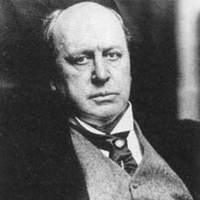Symbolism in James's The Ambassadors
In The Ambassadors, Henry James has used some vital symbols to cater the hidden meaning that he has intended to. Woollett, Paris and gardens are his some symbols in his novel The Ambassadors.

Henry James (1843-1916)
In The Ambassadors gardens symbolize a small form of Garden of Eden. Most of the important action and the turning point of characters take place in various gardens. After arriving in Europe, Strether spent his time in Luxembourg Garden of Parisian Left Bank. It is the very place where he realizes the attractive effects of Paris and doubts on his own mission of taking Chad back to home. Strether and his guide Miss Gostrey have talked for the first time in the garden of their hotel. From then onwards they have turned into good friends. Another important character, Madame de Vionnet and Strether also meet in the garden of Gloriani. Here Strether feels hard for Madame de Vionnet. According to some critics, Gloriani is equated to the serpent of the Garden of Eden, who lured Adam and Eve to go against the will of God and taste the forbidden fruit. Since then the fall of Adam and Eve started and they had lost the innocence. In the same manner, when Strether meets Gloriani and de Vionnet, he loses his sense of innocence and gains the knowledge. In this sense, both Madame de Vionnet and Gloriani stand for the knowledge. From that moment, Strether sees Paris through the eye of rainbow and starts enjoying life in Paris. He even tries his best to convince Chad to stay in Paris for the whole life which Chad rejects. In this way, the gardens in the novel symbolize some crucial events in the life of the characters.
Another equally significant symbol in the novel is Paris. Paris stands for the freedom; the freedom of social behaviors, intellectual freedom, imaginative freedom and freedom from the restriction of social ties. Paris is the cosmopolitan European city. At that time, the culture and the blooming trend in Paris are thought to bring misconduct and wrong tradition in the society. The Americans fear that this culture may corrupt their young minds. The Americans think that the sexual freedom and dreadful relationships are being encouraged by Paris. Chad's mother Mrs. Newsome fears for the adverse effect of Paris on her son Chad, so she sends her ambassador Mr. Strether to take her son back from the vile city. When Strether arrives in Paris he himself feels unconfident on his mission because of the luring and enchanting beauty of Paris and the coolness of the people. At the end of the novel, we find Strether completely changed. He is totally blinded by the Parisian beauty and does not want to return to Woollett. He learns that he can now live moment to moment and enjoys the life as it comes. He leaves the fear of social status and its limitations, what counts for him is absolute freedom from the rigid Mrs. Newsome and her oppressive society.
Third vital symbol Henry James used in his novel is the symbol of Woollett. Almost all actions take place in Paris and no events of the novel take place in Woollett. But still, Woollett keeps its impact throughout the novel. The small city of the America embodies the close minded province where the money is counted and people are judged on the basis of their earnings. The capitalist face of Woollett has ignored to see the personal freedom and intellectual freedom that one needs to satisfy the hunger of knowledge. The fresh and timid American culture does not have faith in its own culture and have fear of the negative influence of Parisian culture. Strether once said that Woollett has “female” culture: a culture full of unnecessary gossips, low confidence, rigid and closed. Strether in Woollett has to live under the suppressive nature of Mrs. Newsome which he relates to Woollett. If he returns back to Woollett he will lose the freedom that he has just gained in Paris after a long time. He also feels sorry for Chad, who has decided to go back to his home town, thinking that he will miss the refinement of the Parisian lifestyle in Woollett. In this way, Woollett represents the rough, capitalist and immature nature of America, whereas Paris stands for the refinement, art and aesthetic.
